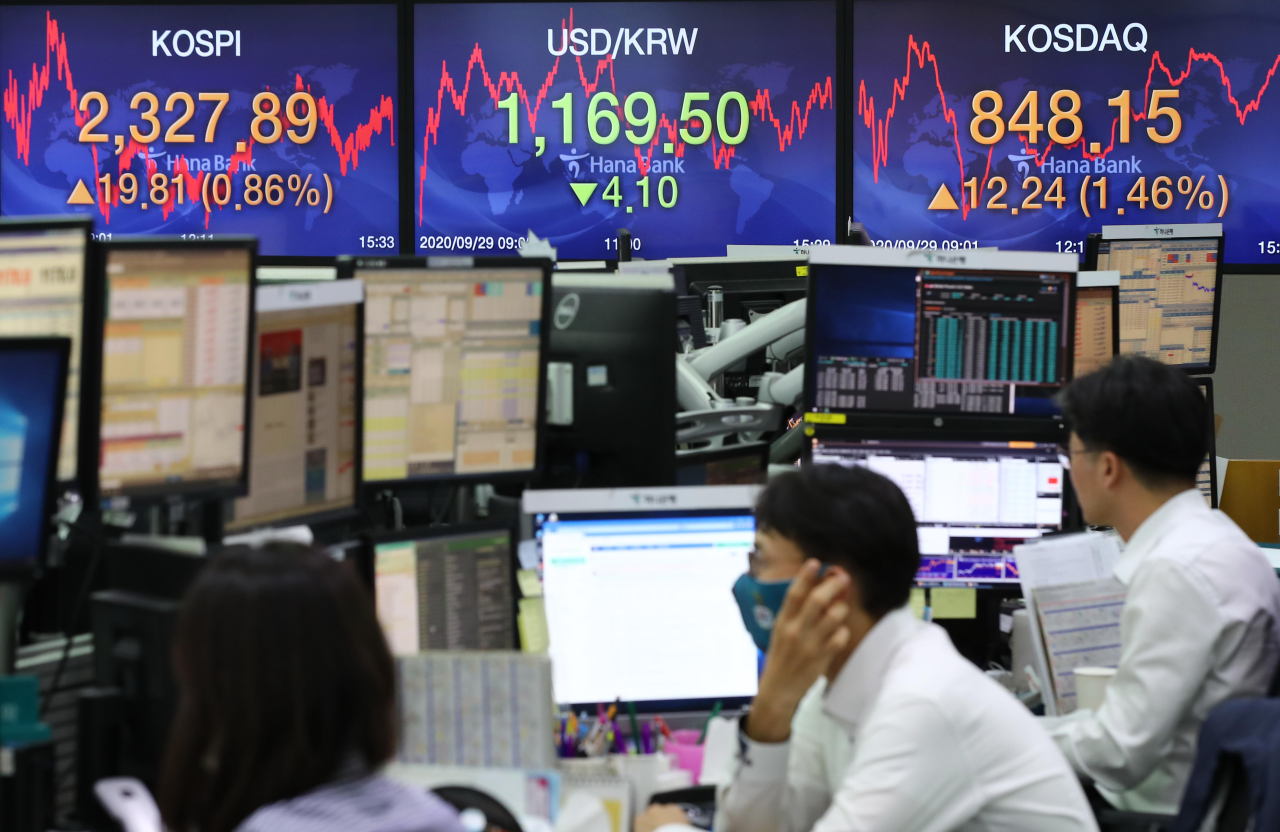 |
KEB Hana Bank employees watch stock and foreign exchange indexes in the's dealing room at the bank's headquarters in central Seoul on Sept. 29, the day before Chuseok holiday. (Yonhap) |
While South Korea is set to expand its definition of a “large shareholder” starting next year, calls are escalating for the forthcoming rule to be alleviated for the sake of market stability and fair taxation.
Some predicted that the stronger regulation might trigger a selling spree at year-end as retail investors seek to avoid a heavier tax burden, and others pointed to the possibility of double taxation.
Under the Income Tax Act, revised in 2017 and due to take effect in 2021, those who possess stocks worth 300 million won ($256,630) or more are classified as “large shareholders” and subject to a transfer tax rate of 22 percent to 33 percent. This is based on the aggregated holdings of all lineal family members -- spouses, parents, grandparents, children and grandchildren.
In an extended move to reinforce the tax obligations of wealthy investors, the Korean government has gradually lowered the criteria to be considered a large shareholder -- from 2.5 billion won to 1.5 billion won in 2018, and then to 1 billion won in 2020.
As tax rates are assessed at the end of each year, market observers speculate that a vast group of retail investors will likely dump their shares in December.
Rep. Kim Byung-wook, the ruling Democratic Party of Korea representative on the parliamentary finance committee, has asserted that the forthcoming revision should specify a grace period. Kim is also the chief of the special parliamentary committee for capital market revitalization.
“(Under the current timeline), retail investors are likely to turn to net sales at year-end (to avoid a tax burden), causing unnecessary volatility in the domestic stock market,” Kim said in a press conference late last month.
This balloon effect could also add liquidity into the already bubble-prone real estate market, further disrupting the capital balance, he added.
Responding to the concerns, the Ministry of Economy and Finance and the regulator Financial Services Commission are currently working on adjusting the definition of a large shareholder, officials said Sunday.
The plan is to announce the initial conclusion as early as November, but the ministry may extend the review until late December. The revision, should it take place, would change the enforcement ordinance and therefore requires only Cabinet approval, but does not require a parliamentary review or parliamentary approval.
The problem is that the market continues to face uncertainty while the government remains undecided.
In August this year, some 70 of the 207 employees at SK Biopharm quit because the value of their stock surpassed 1.6 billion won. The employees were prohibited from selling corporate stocks during their tenure with the company, but wanted to do so before the enhanced tax rules take effect next year.
The Korea Stockholders’ Alliance, a private investors’ group, held a rally in front of Sejong Government Complex to denounce what they saw as excessive regulation. They also pointed out that the large shareholder rule might only be effective for two years as the government is set to impose transfer income tax on all capital gains of 50 million won or more, starting in 2023.
By Bae Hyun-jung (
tellme@heraldcorp.com)








![[Today’s K-pop] Blackpink’s Jennie, Lisa invited to Coachella as solo acts](http://res.heraldm.com/phpwas/restmb_idxmake.php?idx=644&simg=/content/image/2024/11/21/20241121050099_0.jpg)